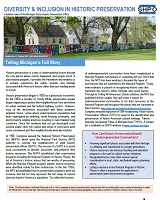Thousands of Resources, Ready to help.
Advantages
Popular

Underrepresented Communities and Historic Preservation in Michigan
The significant places associated with historically Underrepresented Communities in the state of Michigan and beyond represent a particularly fragile class of resource. Many important buildings and sites have been lost as a result of urban renewal and aggressive blight removal programs and demolition related right-sizing that addresses population loss, economic hardship, and years of neglect. As the resource pool is diminished, the cultural legacy and story that the remaining places portray rise in importance.
In 1990, the National Park Service (NPS) acknowledged that the nation’s historic preservation programs lacked diversity. To rectify the omission, NPS published a number of Theme Studies to help all Americans document their histories and tell their stories. In the ensuing years, the National Park Service established a National Historic Landmark Civil Rights Framework, and published detailed studies of additional chapters in the civil rights story by evaluating the long history of issues regarding equal access to public accommodations, education, housing, employment, and voting rights.
In 2014, Congress began appropriating federal monies to the Historic Preservation Fund for the establishment of competitive grant programs to specifically assist underrepresented communities as they identify, document, register and rehabilitate their associated historic resources.
In 2016 the Michigan SHPO applied for and received a Historic Preservation Fund grant to document 20th Century African American Civil Rights sites in Detroit. This built on earlier work to better document the history of Idlewild, a Black resort community in rural Lake County. Participants in Michigan’s 2020-2025 Statewide Historic Preservation Plan workshops identified diversification of the state’s historic preservation programs as a top goal and under that directive the civil rights sites initiative has expanded statewide. To date, Michigan communities have received more than $4 Million in federal grant funds for underrepresented communities historic preservation projects.
Is there a site significant to your community you'd like us to know about? Please send us an email at [email protected] with the details. There are many stories yet to be told!
Historic preservation is a way of understanding history through the very places where events happened, and people stood. How can historic preservation benefit underrepresented communities, who have often been marginalized in National Register nominations and the larger story of our shared history?
The Michigan SHPO is committed to recognizing the history of the state’s underrepresented communities, growing the number of diverse nominations submitted to the National Register, and connecting individuals, non-profits, and local groups with preservation incentives and resources. This bulletin explores some of the opportunities available to help tell a fuller story of Michigan's history.

Diversity and Inclusion in Historic Preservation
Read the BulletinExplore our Community-Centered Historic Preservation Projects
Michigan State Historic Preservation Office rolls out Detroit Civil Rights Bike Tour
The Civil Rights story in Detroit is a story of perseverence and passion. Our new interactive Civil Rights Bike Tour around the city of Detroit highlights many historically significant sites that played a role in the civil rights movement in Michigan’s largest city. Encompassing 20 different stops in total, the tour is nearly 17 miles in length but can be easily broken into shorter segments.
Explore TourThis project is partially funded by the African American Civil Rights and Underrepresented Communities programs of the Historic Preservation Fund, National Park Service, U.S. Department of the Interior, through the Michigan Strategic Fund. Any opinions, findings, and conclusions or recommendations expressed in this material do not necessarily reflect the views of the Department of the Interior or the Michigan Strategic Fund, nor does the mention of trade names or commercial products herein constitute endorsement or recommendation by the Department of the Interior or the Michigan Strategic Fund.